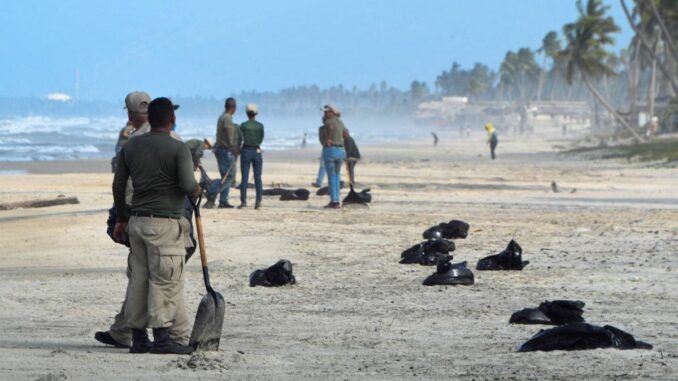
A STUDY conducted by the Technical Education and Skills Development Authority (Tesda) shows that the green job market is on the rise with 5.1 million new positions expected by 2025, which could “transform the job landscape, offering opportunities in sustainability and environmental conservation.” These booming green jobs involve roles that help protect or restore the environment and require green skills or specialized abilities.
The Philippines, which faces a significant challenge in this scenario because there are not enough skilled workers to fill these roles, must upskill its workforce.
Green workers protect the environment. National Parks Institute members collect oil residues at the Boca de Yaracuy beach in Falcon State, Venezuela, after an oil spill filled the beaches with dark puddles. PHOTO BY GABRIELA PEREZ VIA AFP
Project sustainABILITY, a joint initiative by JP Morgan Chase and the Asia Society for Social Improvement and Sustainable Transformation (Assist), addresses this gap by integrating green skills into TVET curricula, thus preparing the nation for environmental jobs, driving a sustainable transformation, and fostering a greener economy.
Assist’s baseline assessment found that “many respondents from the Technical Vocational Education and Training (TVET) and industry sectors either lack an understanding of green skills and jobs or show little interest.” Yet it also noted that there is a general recognition of the importance of acquiring these skills for both employment and environmental awareness.
Project sustainABILITY involves designing a comprehensive and industry-relevant curriculum, developing targeted training programs and creating job placement opportunities. With a focus on Metro Manila and Metro Cebu, the key industry sectors include construction, automotive and land transport, metals and engineering, agriculture, forestry and fisheries.
The project will also aim to train “750 instructors, educate 12,000 students and place 6,000 successful graduates into green jobs,” Assist said in a statement.
Meanwhile, various industry associations and business chambers, including the Philippine Chamber of Commerce and Industry, the European Chamber of Commerce in the Philippines, and the German-Philippine Chamber of Commerce and Industry are collaborating with the initiative to “create more green job positions,” said Assist. They are supported by the Philippine Green Jobs Act of 2016 which incentivizes “businesses to generate employment through green practices, contributing to climate solutions, and utilizing government-supported training and capacity-building platforms.”
Carlos Ma. Mendoza, JP Morgan Chase-Philippines senior country officer, said they remain committed to closing the skills gap in green jobs and preparing the workforce for meaningful employment in the increasingly important sectors.
Francis Macatulad, Assist program director, said, “Collaboration between industries, companies, government agencies, civil society organizations and educational institutions is essential to build the skilled workforce needed for this green revolution.”



Be the first to comment